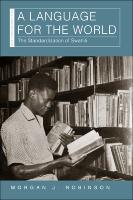A Language for the World
The Standardization of Swahili
| dc.contributor.author | Robinson, Morgan J. | |
| dc.date.accessioned | 2023-12-13T05:32:47Z | |
| dc.date.available | 2023-12-13T05:32:47Z | |
| dc.date.issued | 2024 | |
| dc.identifier | OCN: 1348492573 | |
| dc.identifier.uri | https://library.oapen.org/handle/20.500.12657/86094 | |
| dc.description.abstract | This intellectual history of Standard Swahili explores the long-term, intertwined processes of standard making and community creation in the historical, political, and cultural contexts of East Africa and beyond. Morgan J. Robinson argues that the portability of Standard Swahili has contributed to its wide use not only across the African continent but also around the globe. The book pivots on the question of whether standardized versions of African languages have empowered or oppressed. It is inevitable that the selection and promotion of one version of a language as standard—a move typically associated with missionaries and colonial regimes—negatively affected those whose language was suddenly deemed nonstandard. Before reconciling the consequences of codification, however, Robinson argues that one must seek to understand the process itself. The history of Standard Swahili demonstrates how events, people, and ideas move rapidly and sometimes surprisingly between linguistic, political, social, or temporal categories.Robinson conducted her research in Zanzibar, mainland Tanzania, and the United Kingdom. Organized around periods of conversation, translation, and codification from 1864 to 1964, the book focuses on the intellectual history of Swahili’s standardization. The story begins in mid-nineteenth-century Zanzibar, home of missionaries, formerly enslaved students, and a printing press, and concludes on the mainland in the mid-twentieth century, as nationalist movements added Standard Swahili to their anticolonial and nation-building toolkits. This outcome was not predetermined, however, and Robinson offers a new context for the strong emotions that the language continues to evoke in East Africa. The history of Standard Swahili is not one story, but rather the connected stories of multiple communities contributing to the production of knowledge. The book reflects this multiplicity by including the narratives of colonial officials and anticolonial nationalists; East African clerks, students, newspaper editors, editorialists, and their readers; and library patrons, academic linguists, formerly enslaved children, and missionary preachers. The book reconstructs these stories on their own terms and reintegrates them into a new composite that demonstrates the central place of language in the history of East Africa and beyond. | |
| dc.language | English | |
| dc.subject.other | Foreign Language Study | |
| dc.subject.other | Swahili | |
| dc.subject.other | History | |
| dc.subject.other | Social History | |
| dc.subject.other | Social Science | |
| dc.subject.other | Anthropology | |
| dc.subject.other | Cultural & Social | |
| dc.title | A Language for the World | |
| dc.title.alternative | The Standardization of Swahili | |
| dc.type | book | |
| oapen.relation.isPublishedBy | 907a4342-54b7-4bcc-9208-2d58505573d3 | |
| oapen.relation.isFundedBy | b818ba9d-2dd9-4fd7-a364-7f305aef7ee9 | |
| oapen.relation.isbn | 9780821424957 | |
| oapen.relation.isbn | 9780821424940 | |
| oapen.collection | Knowledge Unlatched (KU) | |
| oapen.imprint | Ohio University Press | |
| oapen.identifier | https://openresearchlibrary.org/viewer/7b63b03d-e2ca-46a3-b889-1a5907d6ab49 |

